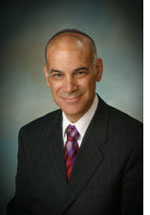By Rabbi Leonard Rosenthal

SAN DIEGO — My grandmother had a deep-seated distrust of non-Jews. Given her childhood, this was understandable. My grandmother grew up in Russia during a time of turmoil, ferment, and rabid anti-Semitism. She told me of the pogroms she and her family survived, and of the Cossacks beating her younger brother.
My grandmother immigrated to the United States as a young girl and never looked back. She lived in the Fairfax district of Los Angeles and socialized exclusively with Jews. She owned a small apartment building and was careful whom she accepted as a tenant. She did rent to non-Jews but was wary dealing with them.
Her story was not unusual. Over centuries of discrimination and persecution, the majority of Jews adhered to the adage, “Scratch any gentile deep enough and you will find an anti-Semite.”
We can trace this suspicion of non-Jews at least as far back as the Rabbinic period. In this week’s parasha we read of the reunion of Jacob and Esau. Years earlier Jacob fled from his brother’s wrath after tricking his father, Isaac, into giving him Esau’s blessing. After marrying Rachel and Leah and starting a family, he decided to return to Eretz Yisrael. He worried about reuniting with his brother. He feared that Esau still held a grudge.
The Torah tells us that Jacob’s fears were unfounded: “Esau ran to greet him. He embraced him and, falling on his neck, he kissed him; and they wept.” (Ex. 33:4) It seems from Esau’s actions that all was forgiven.
The Rabbis, however, had another take on the reunion. They said, “Don’t read “kissed him” but rather “bit him!” They could not believe that Esau, who symbolized the gentile enemies of the Jews, could show honest affection to Jacob. Esau’s real intent must have been to harm him. The commentator known as the Sefat Emet adds that this is the most dangerous kiss of all, a kiss that feigns affection but is intended to harm.
We live in a different world today. At least here in the United States, Jews are not so fearful of our neighbors. For the most part, Jews are well integrated into the cultural and social structure of America.
I was recently speaking with Rabbi Rafi Andrusier of Chabad of East County. He told me of his plans to stage a public Chanukah Menorah lighting at Grossmont Center and Mission Valley Mall. The Shulchan Aruch, Code of Jewish Law, specifies that chanukiyot should be placed outside one’s front door or in the window in order to “publicize the miracle.” However, in times of danger (from marauding bands of anti-Semites) the menorah was supposed to be moved indoors.
Now we do the opposite. We don’t hide, but proudly place our religious symbols in very public places without fear of reprisal. Although I am somewhat ambivalent about such public Menorah lightings, I could not help marvel at how differently Jews behave today than we did in the past. We are part of, rather than dismissive of, the outside world.
I do not deny that anti-Semitism still exists. But I also believe that most of the non-Jews among whom we live do not disdain or deprecate Jews or Judaism. Their affection toward us is not feigned but real.
The challenge for us now is to maintain our distinctiveness as a religion and people, while at the same time integrating into the multi-hued fabric of American life.
*
Rabbi Rosenthal is spiritual leader of Tifereth Israel Synagogue in San Diego. He may be contacted at leonard.rosenthal@sdjewishworld.com